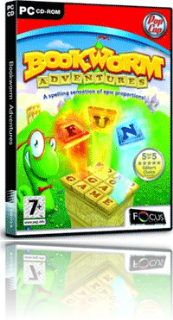 Behold the lowly bookworm—green, bespectacled, and possessing of terrible wit. This little fellow is named Lex, and he’s from a previous game, Bookworm. From our experience with that game, Bookworm Adventures does differ somewhat. For example, the puzzle interface is basically a scrambled set of lettered tiles in a 4×4 field; in Bookworm the selected letters had to be touching in order to spell words—in Bookworm Adventures they can be grabbed from anywhere.
Behold the lowly bookworm—green, bespectacled, and possessing of terrible wit. This little fellow is named Lex, and he’s from a previous game, Bookworm. From our experience with that game, Bookworm Adventures does differ somewhat. For example, the puzzle interface is basically a scrambled set of lettered tiles in a 4×4 field; in Bookworm the selected letters had to be touching in order to spell words—in Bookworm Adventures they can be grabbed from anywhere.
The game presents itself with a somewhat flimsy but adorable narrative about a character trapped in a book about Greek mythology. Her name is Cassandra, a lovely, alabaster skinned Helena of Troy with green eyes and shimmering blonde hair who cries out to Lex for aid. As a bookworm, of course, he feels the need to do the gentlemanly thing, jump between the leaves and leap to her aid. To do so, he must wade through enemies right out of the Iliad and the Odyssey—with no small Greek names to go along with them.
Each chapter is basically a series of enemies who stand on one side of the screen, facing Lex, and wield all manner of weapons, claws, teeth, and foul magics against him. He fights back with his gift of gab—and sometimes truly wince-inducing wit—in the form of spelling words. The longer the word, the greater the damage inflicted on his opponent. This remains the basic puzzle solving mechanism throughout the game. His enemies and Lex himself both have a set of hearts representing health. Run out of hearts, lose the game.
From here, things get interesting.
The first element that adds RPG elements to this otherwise rail-shooter of a spelling puzzle game is a variety of interesting abilities that opponents have. They run a staple sort of attacks that poison or set Lex on fire, continuing to inflict extra damage over time; and also opponents who can stun him for a round while they line up to hit him again; but the real cheerful fun comes from those abilities that affect Lex’s spelling tiles. Some opponents are capable of cracking tiles, making them useless for inflicting damage.
The next element is special items—treasures purloined from beating bosses at the end of each chapter. Every special item adds another effect to Lex’s arsenal, from a special bow that makes tiles of ‘X’, ‘Y’, and ‘Z’ inflict extra damage to foes when used to the golden fleece that reduces damage. While Lex can only carry three of these at a time, he can stack up quite an inventory to choose from which may change the player’s strategic inclination through different chapters.
Finally are puzzle elements involving the tiles; as the game progresses Lex can gain jeweled tiles from successfully spelling words over 4 letters long. Emeralds, rubies, sapphires—each of which causes its own special effect. Emerald: healing; amethyst: poisons enemy; ruby: lights the enemy on fire. To bring the tiles into effect, Lex needs only to use the letter tile with the jewel in the word he spells.
The primary complaint anyone might have about this game is that it’s extremely simplistic. It lacks overall challenge when it comes to word choice and developing strategy; but really the enjoyment of this game for us came from visiting mythological narratives, meeting strange an exotic characters, and getting to beat the everloving crap out of them with our spelling skills.
(And, of course, there is something truly amusing about beating Alexander with the word “EROTIC.”)

Recent Comments